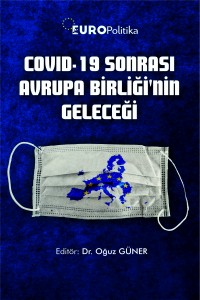Öz
Kaynakça
- Angell, N. (1989). The great illusion revisited: The international theory of Norman Angell. International Studies Rewiev, 341-358.
- Baldwin, D. A. (1980). Interdependence and Power: A Conceptual Analysis. International Organization, 34(4), 471-596.
- Cox, R. W. (1996). Approaches to World Order (Cambridge Studies in International Relations). Cambridge: Cambridge Publisher.
- Dietz, J. L., & Cypher, J. M. (1998). Static and Dynamic Comparative Advantage: A Multi-Period Analysis with Declining Terms of Trade. Journal of Economic Issues, 32, 305-314.
- Garaudy, R. (2004). Le Terrorisme Occidental. France: Paperback.
- Gilpin, R. (2011). Uluslararası İlişkilerin Ekonomi Politiği. Ankara: Kripto Yayınları.
- Gollwitzer, H. (1972). Geschichte des Weltpolitischen Denkens. Göttingen: Ruprecht.
- Gramsci, A. (2007). Prison Notebooks. New York: Columbia Universty Press.
- Holsti, K. J. (1978). A New International Politics? International Organization, 32(2), 513-530.
- Joseph, N. S. (2005). Soft Power. London: Public Affair.
- Keohane, R. (1991). The United States and the Postwar Order: Empire or Hegemony? Journal of Peace Research, 28(4), 437-438.
- Keohane, R. O. (1982). The Demand for International Regimes. International Organization, 36(2), 155.
- Keohane, R. O., & Nye, J. S. (1985). Two Cheers for Multilateralism. Foreign Policy, 61(3), 28.
- Keohane, R. O., & Nye, J. S. (2001). Power and Interdependence. New York: Addison Wesley Longman.
- Kissenger, H. (1994). Diplomacy. United State of America: Pandora.
- Mearsheimer, J. (1990). Back to the Future: Instability in Europe After the Cold War. International Security, 5(1), 12.
- Menzel, U. (2015). Die Ordnung der Welt. İmperium und Hegemonie in derHierarchie der Staatenwelt. Berlin: Suhrkamp Verlag.
- Robert, H. (2006). Montesquieu on Commerce, Conquest, War and Peace. Brooklyn Journal of International Law, 33(1), 2-25.
- Rode, R. (2002). Weltregieren durch İnternationale. Münster: LIT Verlag.
- Salamon, M. S., Roach, S. C., & Griffiths, M. (2011). Uluslararası İlişkilerde Temel Düşünürler ve Teoriler. Ankara: Nobel Yayıncılık.
- Simmons, B., & Haggard, S. (1987). Theories of International Regimes. International Organization, 41(3), 28.
- Wallerstein, I. (2005). Modern Dünya-Sistemi. (L. Boyacı, Çev.) İstanbul: Bakış Yayınları.
- Waltz, K. N. (1970). The Myth of National Interdependence. Cambridge: MIT Press.
- Yılmaz, M. E. (2007). Wethphalia'dan Günümüze Savaş. Uluslararası İlişkiler, 4(14), 12-45.
Öz
Crisis processes experienced in the international system and power gaps that emerged afterwards result in the new hegemonic powers filling that gap. In his work on the Peleponnesian War, Greek Historian Thukididis explains the crises in the history of the whole world when he says “when one power is regressing and fears the competition of another rising power, the roads to wars open up one after the other.” Regardless of the type and extent of the crises, emerging forces are obliged to protect their new areas beyond protecting their own fields. Although these areas differ in the new global system, they have opened new doors at a time when the era of total war is over. Here, in these newly established 'game theories', countries have adopted new theories, while shifting the power struggle to another area. In this study, we will discuss how the European Union tries to establish the balance of power in the world system that is faced with a pandemic crisis and the struggle of European countries to become hegemonic power by using interdependence while integrating into this system.
Anahtar Kelimeler
Kaynakça
- Angell, N. (1989). The great illusion revisited: The international theory of Norman Angell. International Studies Rewiev, 341-358.
- Baldwin, D. A. (1980). Interdependence and Power: A Conceptual Analysis. International Organization, 34(4), 471-596.
- Cox, R. W. (1996). Approaches to World Order (Cambridge Studies in International Relations). Cambridge: Cambridge Publisher.
- Dietz, J. L., & Cypher, J. M. (1998). Static and Dynamic Comparative Advantage: A Multi-Period Analysis with Declining Terms of Trade. Journal of Economic Issues, 32, 305-314.
- Garaudy, R. (2004). Le Terrorisme Occidental. France: Paperback.
- Gilpin, R. (2011). Uluslararası İlişkilerin Ekonomi Politiği. Ankara: Kripto Yayınları.
- Gollwitzer, H. (1972). Geschichte des Weltpolitischen Denkens. Göttingen: Ruprecht.
- Gramsci, A. (2007). Prison Notebooks. New York: Columbia Universty Press.
- Holsti, K. J. (1978). A New International Politics? International Organization, 32(2), 513-530.
- Joseph, N. S. (2005). Soft Power. London: Public Affair.
- Keohane, R. (1991). The United States and the Postwar Order: Empire or Hegemony? Journal of Peace Research, 28(4), 437-438.
- Keohane, R. O. (1982). The Demand for International Regimes. International Organization, 36(2), 155.
- Keohane, R. O., & Nye, J. S. (1985). Two Cheers for Multilateralism. Foreign Policy, 61(3), 28.
- Keohane, R. O., & Nye, J. S. (2001). Power and Interdependence. New York: Addison Wesley Longman.
- Kissenger, H. (1994). Diplomacy. United State of America: Pandora.
- Mearsheimer, J. (1990). Back to the Future: Instability in Europe After the Cold War. International Security, 5(1), 12.
- Menzel, U. (2015). Die Ordnung der Welt. İmperium und Hegemonie in derHierarchie der Staatenwelt. Berlin: Suhrkamp Verlag.
- Robert, H. (2006). Montesquieu on Commerce, Conquest, War and Peace. Brooklyn Journal of International Law, 33(1), 2-25.
- Rode, R. (2002). Weltregieren durch İnternationale. Münster: LIT Verlag.
- Salamon, M. S., Roach, S. C., & Griffiths, M. (2011). Uluslararası İlişkilerde Temel Düşünürler ve Teoriler. Ankara: Nobel Yayıncılık.
- Simmons, B., & Haggard, S. (1987). Theories of International Regimes. International Organization, 41(3), 28.
- Wallerstein, I. (2005). Modern Dünya-Sistemi. (L. Boyacı, Çev.) İstanbul: Bakış Yayınları.
- Waltz, K. N. (1970). The Myth of National Interdependence. Cambridge: MIT Press.
- Yılmaz, M. E. (2007). Wethphalia'dan Günümüze Savaş. Uluslararası İlişkiler, 4(14), 12-45.
Ayrıntılar
| Birincil Dil | İngilizce |
|---|---|
| Konular | Uluslararası İlişkiler |
| Bölüm | Araştırma Makalesi |
| Yazarlar | |
| Yayımlanma Tarihi | 5 Kasım 2020 |
| Gönderilme Tarihi | 1 Eylül 2020 |
| Yayımlandığı Sayı | Yıl 2020 Cilt: 4 Sayı: 2 |


